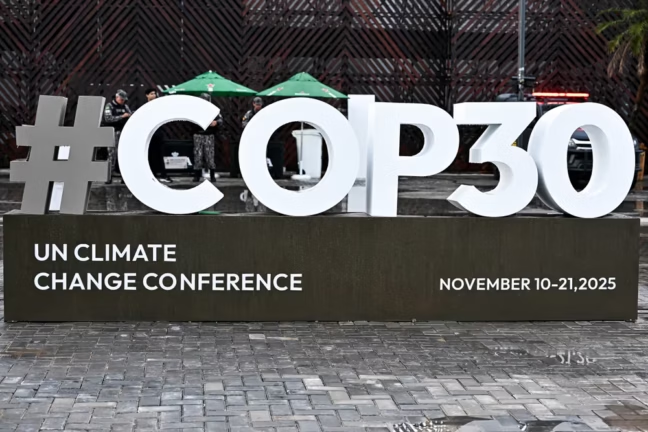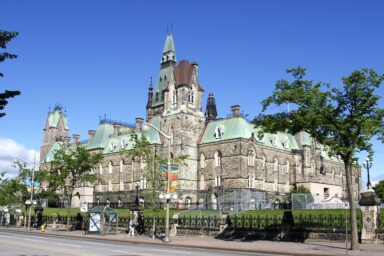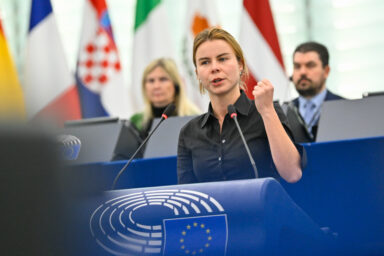Heads of the European Parliament delegation to the COP30 global climate conference in Belém, Brazil admitted that discussions on tripling funding for the fight against climate change have not yet led to concrete results. According to Commissioner Hoekstra and MEP Pereira, it is crucial to agree on phasing out fossil fuels.
“We are coming dangerously close to a tipping point with no way back” or “This COP must be a COP of implementation”. Such lofty phrases were heard on Wednesday, November 19, at a press conference held as part of the COP30 World Climate Conference in Belém, Brazil. It was attended by MEPs Lídia Pereira (EPP/PRT), head of the European Parliament’s delegation to COP30, and Wopke Hoekstra, Commissioner for Climate, Net Zero and Clean Growth.
Phasing out or transitional road map?
However, when it came to specific issues, both politicians had to admit that the desired goals were still a long way off. “We have had hard conversations about climate finance with our partners,” Commissioner Hoekstra replied to a journalist’s question. Mr Hoekstra added that “we want to be sure that this money would reach the most vulnerable”.
Regarding phasing out fossil fuels, Mr Hoekstra said that “it remains EU’s priority”, but also admitted that some of the world’s big players are against such wording. And tried to explain that there may be just a subtle difference between ’phasing out’ and ’transitional road map’. The latter expression (with regard to the gradual reduction of fossil fuels) is favored by some of the ’fossil’ countries like Saudi Arabia or India.
EU to remain climate leader
In late October, European Parliament adopted its priorities for the COP30 conference. The resolution underlined the need for the EU to remain a leader in international climate negotiations. It stresses that all sectors must contribute to reducing emissions and achieving climate neutrality.
MEPs want all countries to contribute their fair share in providing adequate climate finance, addressing debt crises in many climate-vulnerable countries and simplifying climate finance procedures for developing countries.
COP30 is not just another climate summit; it is a moment of truth for all of us. Europe must choose the future it wants to build. – MEP Lídia Pereira, Parliament’s delegation chair
MEP Perreira, Parliament’s delegation chair, reiterated Parlaiment’s position directly in Belém. “COP30 is not just another climate summit; it is a moment of truth for all of us. Europe must choose the future it wants to build, and lead with ambition, responsibility, and courage. With practical measures, we can reinforce Europe’s global leadership and demand fair, effective climate action, from adopting the 2035 target to phasing out fossil fuels. COP30 will test our resolve, and Europe must rise to the challenge.”, Ms Pereira said.
Breakthrough in sight?
A report published at the COP30 summit suggests that sticking to three key climate promises (on renewables, energy efficiency and methane) would avoid nearly 1C of global heating thus giving the world hope of avoiding climate breakdown.
Governments have already agreed to triple the amount of renewable energy generated by 2030, double global energy efficiency by then, and make substantial cuts to methane emissions.
You might be interested
According to the Climate Action Tracker coalition, sticking to these promises would be a sort of a ’gamechanger’. It would shave 0.9 degree of Celsius from projected temperature rises this century.
“If governments achieve this by 2035, it would be a gamechanger, quickly slowing the rate of warming in the next decade and lowering global warming this century from 2.6C to about 1.7C,” said Bill Hare, chief executive of Climate Analytics.
This is close to the target of limiting global heating to 1.5C above preindustrial levels that is at the core of the 2015 Paris climate agreement. According to Mr Hare, “the findings are really quite stunning. It would be the first big improvement, and a major step forward.”
The 30th UN climate conference, which started on 10 November, is nearing its end. The final negotiations are scheduled to take place on Friday, 21 November. In the past years, however, discussions were often extended in an effort to reach an acceptable compromise.











